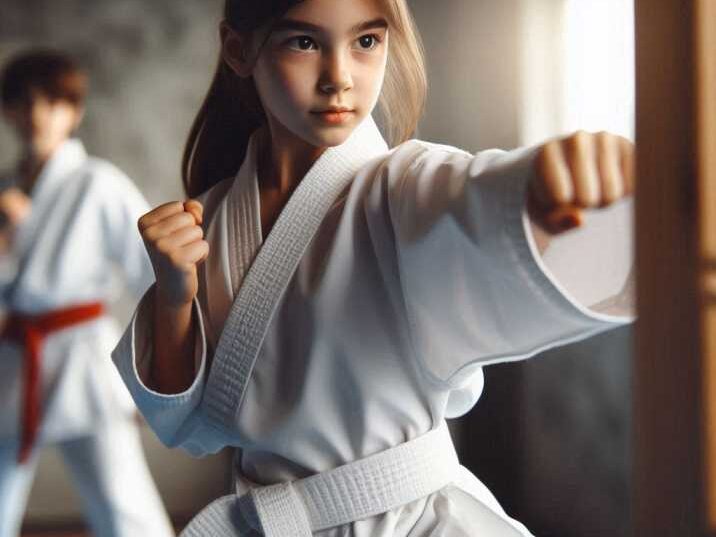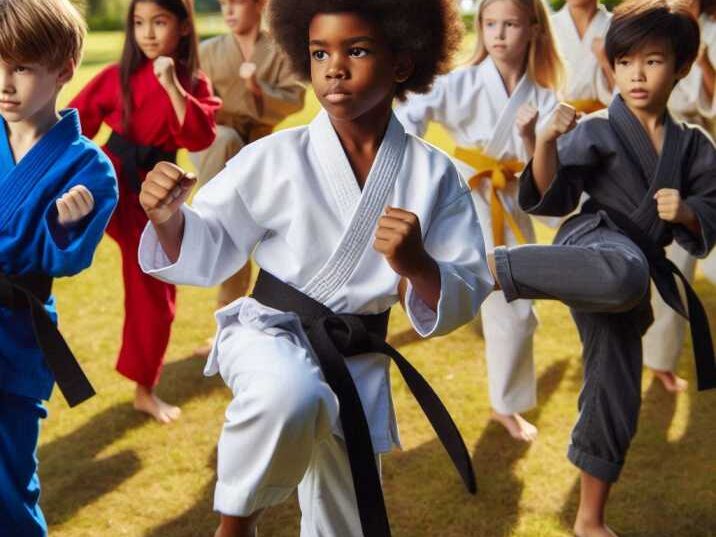Starting martial arts at a young age can be an exciting and rewarding journey. But how young is too young? Many parents wonder when it’s the right time for their child to begin learning the skills, discipline, and focus that martial arts training offers. This article will explore the ideal and youngest age to start martial arts for children, The benefits of early training, and how it can positively impact their development in school and life. By the end, you’ll understand the key factors to consider and how martial arts can be an excellent activity for kids.

Introduction to Martial Arts for Children
Table of Contents
Martial arts are more than just learning how to kick and punch. They are about discipline, focus, respect, and self-defense. For children, these skills are even more important as they help in shaping their behavior, improving their confidence, and building strong physical and mental habits. But how young can kids start learning martial arts? That’s what this article aims to explore.
Benefits of Martial Arts Training at a Young Age
Martial arts can provide many benefits to children as young as 3 or 4 years old. Here’s why starting early might be a good idea:
Improved Focus: Martial arts training demands concentration, teaching children how to channel their energy and listen attentively to instructions. This practice of focus helps improve their ability to concentrate, not only in martial arts but also in school and other activities.
Physical Development: Through martial arts, children enhance their balance, coordination, and strength. These physical skills are crucial during their early years of development, supporting their overall health and motor skills as they grow.
Discipline and Respect: A core principle in martial arts is respect for instructors, fellow students, and oneself. By learning discipline, children develop self-control, patience, and an understanding of the importance of respecting others.
Confidence Building: Martial arts offer a structured path with levels and belts, allowing children to feel a sense of accomplishment as they progress. Achieving goals helps boost their self-confidence, making them more sure of their abilities in both sports and everyday life.
Social Skills: Practicing martial arts in a group setting teaches children how to cooperate and communicate effectively with others. It helps them make friends and learn the importance of teamwork and sportsmanship.
What Is the Youngest Age to Start Martial Arts?
Most experts agree that children as young as 3 to 4 years old can begin martial arts training, though this depends on the child’s development and the type of martial art. For example, activities like karate, taekwondo, and Brazilian Jiu-Jitsu often offer classes designed specifically for toddlers.
Martial Arts for Toddlers (Ages 3-4)
Children this young typically focus on basic movements, motor skills, and listening. The goal is to introduce them to the idea of martial arts in a fun and engaging way, often through games and interactive exercises.
Martial Arts for Kids (Ages 5-7)
At this age, children are ready for more structured training. They can follow directions better, and their motor skills and coordination have developed further. Many instructors recommend this as an ideal time to start more serious martial arts training.
Martial Arts for Older Kids (Ages 8-12)
Children in this age group have the maturity to understand martial arts concepts such as respect, discipline, and responsibility. They can engage in more complex techniques and even participate in light sparring or tournaments, depending on their progress and the type of martial art.
Factors to Consider When Starting Martial Arts
When deciding if your child is ready for martial arts, several factors should be considered.
Physical Readiness
Is your child physically developed enough to handle the movements and techniques required? Martial arts can be physically demanding, so it’s important to choose a style that matches your child’s abilities.
Mental Readiness
Focus and patience are key components of martial arts. Children need to be able to concentrate during classes, follow instructions, and respect their peers and instructors. If your child has trouble sitting still or focusing, they may benefit from waiting a bit longer.

Choosing the Right Martial Art
Each martial art has its own focus and style. Martial arts for children, like karate and taekwondo may be best because they emphasize discipline and form. Brazilian Jiu-Jitsu and Judo are great for children who enjoy grappling and groundwork. It’s important to find a class that matches your child’s interest and temperament.
Qualified Instructors and Programs
Finding the right instructor is crucial. Look for schools that offer specific programs for young children, with experienced instructors who know how to make martial arts fun, safe, and educational for younger students.
Types of Martial Arts for Children
Each martial art brings something different to the table. Here are a few types of martial arts that are great for children.
Karate
Karate is one of the most popular martial arts for children. It focuses on striking techniques such as punches, kicks, and blocks. Karate emphasizes discipline, respect, and self-control.
Taekwondo
Known for its dynamic kicks, Taekwondo teaches balance, speed, and agility. It’s excellent for kids who have a lot of energy and love movement.
Brazilian Jiu-Jitsu (BJJ)
BJJ focuses on grappling and ground fighting. It teaches children how to defend themselves by using leverage and technique rather than strength. BJJ is great for building problem-solving skills.
Judo
Judo, like BJJ, focuses on grappling but emphasizes throws and takedowns. It helps children develop coordination and strength in a safe environment.
Table: Martial Arts and Ideal Starting Ages
| Martial Art | Ideal Starting Age | Focus |
|---|---|---|
| Karate | 5-6 years | Striking, discipline |
| Taekwondo | 4-5 years | Kicking, speed, balance |
| Brazilian Jiu-Jitsu | 4-6 years | Grappling, self-defense |
| Judo | 5-7 years | Throws, takedowns, coordination |
| Kung Fu | 7-9 years | Striking, flexibility |
Benefits of Martial Arts for School and Daily Life
Martial arts aren’t just about self-defense. The skills learned in martial arts translate into better academic performance and everyday behavior. Here’s how:
Focus and Attention: Martial arts require students to pay close attention to their instructor and each move they make. This enhanced focus translates into better concentration in the classroom, helping kids stay attentive to lessons and complete tasks more effectively.
Problem-Solving Skills: Many martial arts, especially grappling arts like Brazilian Jiu-Jitsu (BJJ), require strategic thinking to overcome challenges. This critical thinking helps children learn how to analyze situations, solve problems under pressure, and make quick decisions—skills that are valuable both in academics and everyday situations.
Time Management: Regular martial arts practice instills a sense of discipline and routine in children. They learn how to manage their time between school, martial arts, and other activities, fostering responsibility and good organizational habits that benefit their overall productivity.
Stress Relief: Martial arts provide a healthy outlet for children to release their physical energy and manage emotions. The physical activity, combined with the mental focus required, helps kids reduce stress, stay calm, and build emotional resilience in their daily lives.
Conclusion
Starting martial arts at a young age can provide lifelong benefits. From improved focus and discipline to physical health and social skills, martial arts offer kids the chance to develop in a fun and structured environment. While the youngest age to start martial arts may vary, children as young as 3 or 4 can begin learning the basics, setting the stage for growth in both body and mind.
FAQs
1. What age should a child start martial arts?
Children can start martial arts as early as 3-4 years old in beginner-level programs.
2. What’s the best martial art for young children?
Karate and Taekwondo are great for younger children due to their structured and discipline-focused nature.
3. Can martial arts help with school performance?
Yes, martial arts can improve focus, discipline, and problem-solving skills, which can positively impact school performance.
4. Is martial arts safe for young kids?
When taught by a qualified instructor, martial arts are safe for young kids and are designed to build confidence and discipline.
5. How often should a child practice martial arts?
Most children benefit from practicing 2-3 times a week, but this can vary depending on the child’s age and goals.


